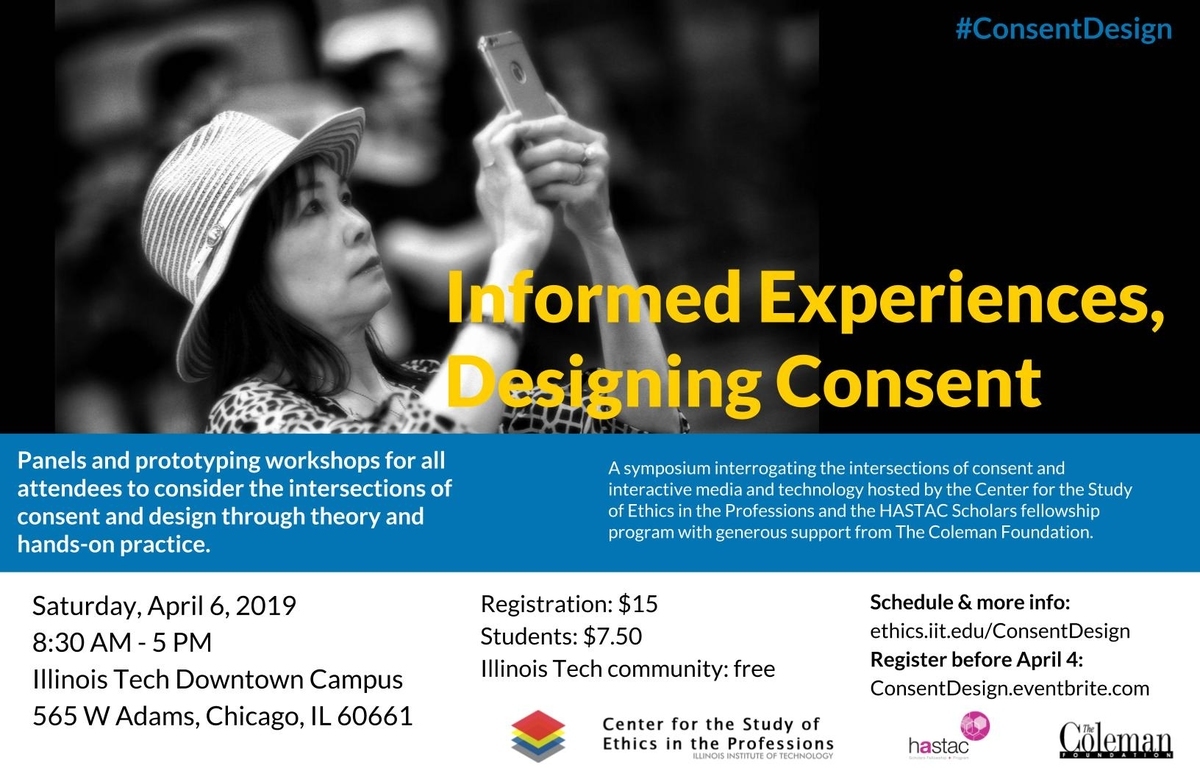Designs, whether implicitly or explicitly, cite core values that influence their development, marketing, and use. All too often, technology and interactive media are designed around profit, efficiency, objectivity, and other similar values that contribute to normalizing certain bodies, cultures, identities, and communities over others.
Informed Experiences, Designing Consent was an event conceptualized and organized to bring together scholars, researchers, practitioners, students, and audiences to think through the intersections of consent and design of interactive media and technology. I conceived the idea from my own experience as a scholar-practitioner of games as a means of carving out a space for participants to center consent in theory and practice. With help from Elisabeth Hildt and Kelly Laas at the Center for the Study of Ethics in the Professions at Illinois Institute of Technology and Leilasadat “Leila” Mirghaderi, a graduate student in Technology and Humanities at Illinois Institute of Technology, we brought this idea to fruition.

Poster used to advertise the event.
On April 6, 2019 several participants of various backgrounds–researchers, practitioners, educators, and students–gathered at Illinois Tech’s Downtown Campus to interrogate the intersections of consent and design through what I call a “Learn, Make, Reflect Model.” This model utilizes three components to combine theory and embodied practice in learning as a community:
- Learn: a selected panel speaks on a given topic. These presentations provide frameworks and considerations from varied perspectives.
- Make: prototyping breakout sessions that engage the given topic. From the frameworks proposed in presentations, all attendees collaborate on hands-on practices of designing and prototyping something drawing from the frameworks and offerings of the panel.
- Reflect: after the breakout sessions, all attendees return to discuss their maker experiences. This offers moments for generative forms of knowledge production in which all attendees contribute from their perspectives.

The two interdisciplinary panels explored consent through studies that situated the importance of understanding consent in technologies we use every day, designing technologies, games, and data collection. Christine Miller, Ruth Schmidt and John Cain kicked off the first panel by reflecting on user agreements to provide a framework for designing informed decisions. Daniel Lipson’s focus on Alternate Reality Games presented a case for “critical consent” in games that operates through players “playing back.” Through her study of chat bots, Camille Vezy provoked deeper considerations between UX and consent and problematized practices of obtaining consent from users. Peter McDonald argued that studying consent in games necessitates the study of passivity, that is how the game also acts upon the players, as a way of making palpable basic violences, such as hunger, to which vulnerable communities cannot consent but instead have enacted upon them. Monika Sziron then considered the ethical debates of robots as a moment to think through how we ascribe moral status, how we grant or revoke rights to informed consent, and how we in turn are shaped by these intersections when we design. Wrapping up the first panel, Kate Hollenbach then reflected on her digital artwork that randomly collected video from her smartphone and presented it within a digital art installation, through this project, she highlighted the tensions between privacy, UX, and data collection.
After the first panel, attendees broke out into prototyping groups to design an artifact centered on consent. Our prototyping groups included games, user experiences, data collection, mobile app development, craft/maker projects, research methodology, and pedagogy. Using guidelines for prototyping, groups used prototyping materials to materialize the frameworks of knowledge from the first panel. Some explored expressing consent (through clothing), consent as a social and communal negotiation (in games and pedagogy), and usability and transparency (in data collection, UX, and research).
Organizers designed the event so the afternoon iterated on concepts and practices from the morning sessions. Cansu Canca complicated the practices of informed consent with AI coaches, observing how these devices collect all types of data of users outside of their marketed purpose. Observing the tensions between power and consent, Spencer Keralis decried faculty exploitations of student labor in the classroom. Considering practices of monetization and data collection, Timothy Ayodele then highlighted issues of consent and privacy when companies sell information about user networks to third parties. By contrasting settings of Frigid Farah and consent apps with The Realistic Kissing Simulator, Josef Nguyen called for more celebratory practices of consent that broaden our understanding of this concept beyond binary (yes/no) uses. Nik Rokop finished the panel, offering audience-centered frameworks for design.
During the following prototyping session, attendees were tasked with iterating on their prototypes by thinking about the insights from the second panel. From these iterations, many groups explored more ways to demarcate boundaries, celebrate consent in their practices, provide more transparency in their designs, and offer more dialogue between designers and users to structure consent as a conversation.

After a gallery walk in which attendees could experience, use, and play with other groups’ prototypes, I guided a wrap up reflection. During this session, participants discussed how this event structure allowed each of them to become active in theorizing about consent by thinking through their design. Panelists from different fields of study offered several perspectives that complicated privileged practices of obtaining, structuring, and understanding consent. The conversations happening during prototyping sessions postured each of them differently within the space to where they each contributed to how the group’s design navigated consent. In turning towards the future, many expressed a need for more events fostering critical thinking about navigating the role of consent specifically and ethical issues broadly and design/technology.

Additional resources, including CFP, event advertisements, a PDF of the webpage, event posters and schedules, and more photos from the event are available through the Illinois Institute of Technology Institutional Repository.
This content is cross-posted on Research and Destroy and the Center for the Study of Ethics in the Professions Newsletter.
